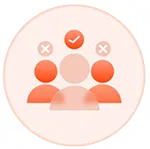A company is run by many subdivisions within it. The work is equally distributed to all departments of an organization based on the capabilities and specializations. Relying on the same set of staff for everything is perhaps the worst decision one could make for their business. The different departments like finance and accounting, business development, legal, etc., thrive on the base built by the human resource department. It manages all the employees in a workplace and helps guarantee for an efficient workflow. Along with its components, HR management, and HR planning, it forms an invincible network for an organization. Here is a brief introduction to HR, HRM, and, HRP.
What is Human Resource?
Putting it technically, human resources are defined as the division of an organization that deals with hiring, training, and administration of employees. It is undoubtedly the most important department of any organization as it directly influences the type of people that would work for the company. An HR department is expected to carry out almost all the functions related to labor from hiring to training. Some of the major functions include:
- Recruitment of employees based on the required skill set for the job profile
- Formulation of goals for individual employees and assessing their performance
- Promotion, transference, or demotion based on employee performance
- Processing a carefully calculated payroll for employees based on the amount of work tackled and total working days
- Motivating employees to help them stay focused on their goals
- Maintaining harmony amongst the members of a team
- Distribution of bonuses to those deserving
- Looking after the implementation of company policies by the employees
Apart from these major functions, there’s also so much small work that an HR department has to take care of. The workload on HR is immeasurable which is why human resource management becomes crucial.
What is HR Management?
Human resource management is the process of employing, training, and evaluating the employees of an organization by the HR department. In simple words, it means managing the employees of a workplace by HR. It undertakes management functions like planning, organizing, directing, and controlling. Listing out the roles of HR management, we have:
- Employment, training, and maintenance of employees
- Formulating goals for individual employees and helping them accomplish the same
- Organizing social events for the workforce to maintain a sense of harmony amongst the workers
- Rewarding employees for their hard work with bonuses or incentives to keep them motivated
- Attending to employee complaints and queries like workplace harassments or discomfort of any sort
Needless to say, the importance of HR management is endless. It helps erase any space for chaos and develops useful human resources for the company. To live up to all these management requirements, strategic human resource planning is integral.
What is Human Resource Planning?
Human resource planning is the first step in HR management. HR planning refers to the set of strategies employed to utilize human resources to the fullest.
It involves structuring a skill-set based on which an employee would be hired; strategies that would help to improve the quality of human resources and maintaining them. It helps in human resource development along with HR management. As it is fairly obvious, human resource planning aims to recruit the right employee for the right work so that maximum benefit can be exploited. The major objectives of human resource planning processes include:
- Predicting future requirements
- Assessing current strength
- Comparing present and future requirements
- Planning to prepare for future requirements
With optimum planning, the path of success becomes clearer as one has a drawn-out map of how and what has to be done. While planning, a lot of factors need consideration to evade chaos, for example:
- Government Policies- labor policies, industrial policies
- Technological Advancements- determines what kind of manpower is required
- Company Policies
- Job Analysis- determining what kind of job requires recruitment of human resource
- Long-term Effectiveness- checks if plans would benefit the company in the long-run
These along with different other factors need close attention otherwise HR planning can be a very error-prone process negatively affecting the growth of an organization. If a good plan can boost your company’s presence, a bad one can have catastrophic effects success-wise.
Since we have gone over the functions of an HR department, it is established that it has some of the most cumbersome jobs in the business. Traditionally, all of these required personal attention and physical interference but today, with revolutionizing digitalization, one can tackle multiple HR activities conveniently.
Since we have gone over the functions of an HR department, it is established that it has some of the most cumbersome jobs in the business. Yes, I am talking about the human resource management system or HR software. With HRMS tools, you can exploit benefits like planning, recruiting, performance management, attendance management, payroll formulation, shift management, employee self-service, and what not!
Today, you have a chance to spare your HR time for performing tasks that require personal attention like motivating employees or socializing with them in general. Go digital!



























